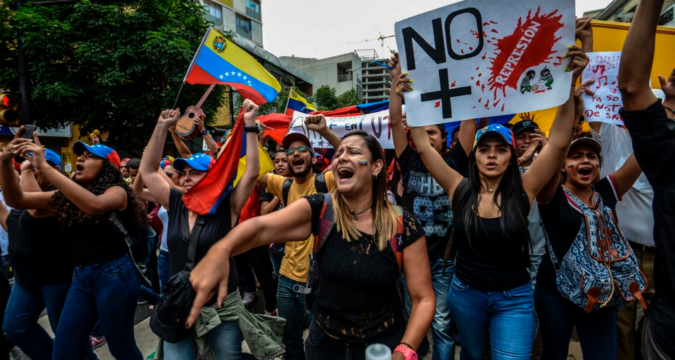
On Saturday, members of the political opposition in Venezuela and their supporters convened in several locations across the nation to call for the acknowledgement of their candidate’s apparent overwhelming triumph in the presidential election that took place about three weeks prior.
With little less than 52% of the vote, President Nicolas Maduro was declared the winner of the July 28 election by the nation’s electoral body, which is viewed by the opposition as an extension of the ruling party.
However, the opposition, backed by former lawmaker Maria Corina Machado, claims to have obtained 83% of the vote tallies from voting machines online, giving its candidate, Edmundo Gonzalez, a solid 67% of the vote.
The nation, already struggling economically, is in political turmoil following the contested referendum, and at least 2,400 people have been arrested as a result of the government’s assault on protesters. At least 23 people have died as a result of clashes related to the protests.
The majority of the recommendations made by the international community to end the electoral crisis, which has lasted for almost three weeks, have been flatly rejected by the opposition and the ruling party.
Thousands of people gathered along the main street in the eastern section of Caracas, the capital city.
Machado demanded that her supporters remain in the streets and demanded an independent, international certification of the election while standing atop a truck in the middle of the throng.
“The people have spoken, and nothing can override their voice,” she declared.
Theology student Jesus Aguilar, 21, stated that he supported the opposition because he wanted a better future: “We realize that there are no growth prospects with this government. I’ve even caught myself attempting to flee the nation.”
Venezuelans were out in the streets in cities all throughout the nation. By nine in the morning, hundreds had assembled in Maracaibo, the formerly oil-rich city in the northwest of Venezuela.
52-year-old Noraima Rodriguez told Reuters, “We don’t have any more fear; we have already been through the worst.” “The university hospital’s lack of medical supplies is the reason my daughter passed away. Though I have nothing to lose, I do want my grandchildren to have a future.”
Hundreds of people protested in Valencia, San Cristobal, and Barquisimeto; many of them carried copies of voting tallies, protest placards, or Venezuelan flags. Tear gas was used to disperse roughly one hundred protestors in Maracay, which is located roughly 110 km (70 miles) west of Caracas.
The diaspora of Venezuela flocked from Bogota to Madrid. Nearly a thousand people flocked to the central Plaza de la Revolucion in downtown Mexico City.
“This is the time for a Venezuela that is free,” declared 30-year-old street vendor Jesus Mata, who came to Mexico two years ago.
He was one of tens of thousands of Venezuelans who crossed the dangerous Darien Gap, which separates Colombia and Panama and is known for rapes, kidnappings, robberies, and other risks. The nation’s political and economic crises served as its driving forces.
“I wish for freedom and an end to the 25 years of darkness so that the approximately 8 million Venezuelans living abroad can return home,” he stated.
Over 73% of Venezuela’s GDP has been lost since 2013, under Maduro’s leadership, according to academics at the Institute of Superior Administration Studies in Caracas.
After a government-supporting march, Maduro blasted the opposition and foreign opponents while promising 8% growth this year at Miraflores Palace.
As world attention shifts, the opposition is still pressing for recognition of its victory, but its options are becoming more limited, opposition sources and experts told Reuters this week.
While Russia, China, and other nations have congratulated Maduro on his win, numerous Western nations have called for the results to be fully published.
According to the president of Panama, officials from Latin America will talk about the problem this coming weekend while many are in the Dominican Republic for the country’s new president’s inauguration.